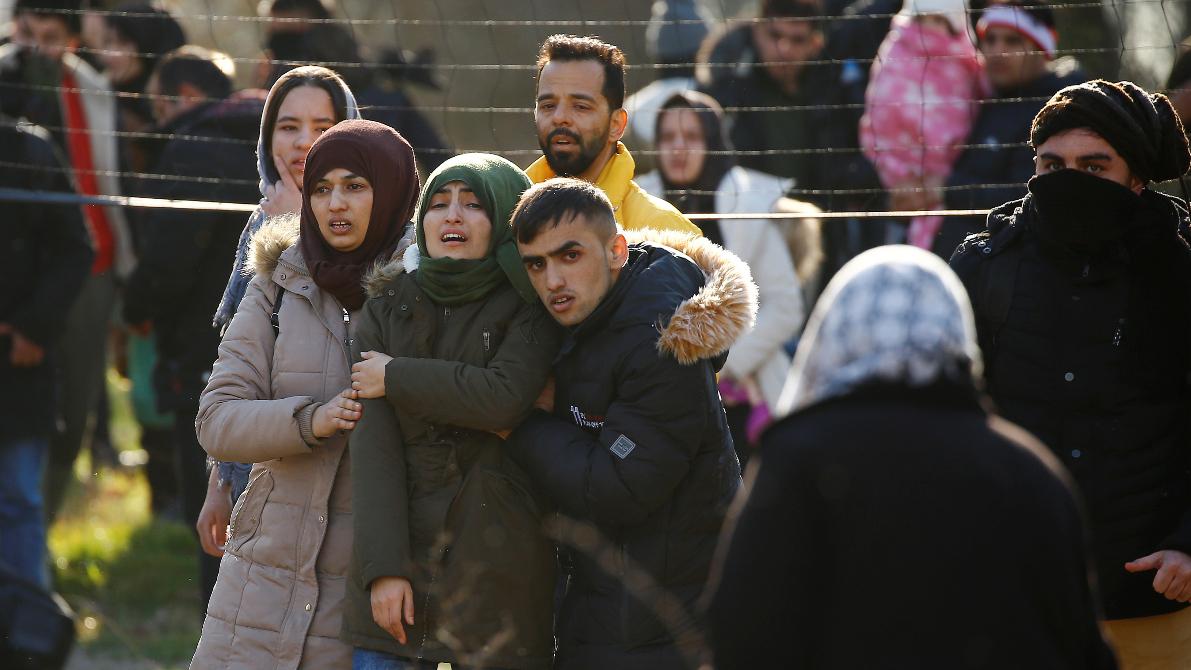Turkey says it will no longer stop refugees from reaching Europe amid escalating Syrian war
Refugees in Turkey headed toward European frontiers on Friday after an official said the borders had been thrown open, a response to the escalating war in Syria.
Ankara indicated it will no longer prevent refugees from going to Europe in protest of what it sees as Western inaction, a move that would reverse a 2016 pledge to the EU. Greece and Bulgaria reacted by tightening their borders.
In Istanbul on Friday, refugees from Syria clamored to board buses to Bulgaria. Other migrants are heading for the Greek islands, and hope to enter the European Union by boat.
The serious escalation in violence in the northern Syrian province of Idlib follows the death of 33 Turkish soldiers in an airstrike Thursday night — the deadliest attack on the Turkish army since intervening in Syria in 2016. The situation has raised fears of a direct, armed confrontation between Turkey and Russia, which backs Syrian President Bashar al-Assad.
Moscow and Ankara traded blame over Thursday’s strike in northwest Syria. Russia’s foreign minister, Sergei Lavrov, said the tragedy could have been avoided if the Turkish military had notified Moscow of the position of Turkish troops. Turkey has rejected that claim and has appealed to its NATO allies and the European Union for support.
NATO Secretary-General Jens Stoltenberg expressed concern about the escalation in fighting. Stoltenberg called on the Syrian government and its ally, Russia, to halt their offensive.
“This dangerous situation must be de-escalated and we urge an immediate return to the 2018 ceasefire to avoid further worsening of the horrendous humanitarian situation in the region and to allow urgent humanitarian access for those trapped in Idlib.”
“This dangerous situation must be de-escalated and we urge an immediate return to the 2018 ceasefire to avoid further worsening of the horrendous humanitarian situation in the region and to allow urgent humanitarian access for those trapped in Idlib,” Stoltenberg said in an official NATO press release.
The recent fighting in northern Syria has displaced at least a million people in Idlib province, adding to the humanitarian catastrophe of nearly 4 million refugees who have crossed into Turkey since the start of the Syrian war.
Related: UN asylum case opens the door to protections for climate refugees
Huzayfa Al-Khateeb, a radio reporter for the Syrian Watan FM station in Idlib, and a volunteer relief worker with the Mulham Volunteering Team, which assists displaced civilians and people in need inside Idlib province, said people have been shaken by the bombings. Many had planned to leave Idlib prior to the attacks.
“People here are very afraid because of the Assad regime and Russia’s bombing and airplane strikes of Idlib city and the rural [areas] of Idlib City. But before this time, we were thinking about [going] to the border and smash the wall and cross to Turkey and then to Europe.”
“People here are very afraid because of the Assad regime and Russia’s bombing and airplane strikes of Idlib city and the rural [areas] of Idlib City,” Khateeb said. “But before this time, we were thinking about [going] to the border and smash the wall and cross to Turkey and then to Europe.”
Related: Analysis: The walls are closing in on Idlib. We cannot ignore the humanitarian crisis.
Khateeb, who was displaced from his hometown in Western Ghouta in 2016, says the living conditions for people in Idlib are devastating. “People need everything. This year, nine people [have died] because of the lack of heating. People have nothing to warm their children, their families. It is so miserable,” Katheeb said. “No word can describe the way they are living.”
Russian and Syrian government forces continue to attack Idlib province in the northwest of Syria to destroy the last major rebel stronghold inside the country.
Reuters contributed to this report.
We want to hear your feedback so we can keep improving our website, theworld.org. Please fill out this quick survey and let us know your thoughts (your answers will be anonymous). Thanks for your time!
